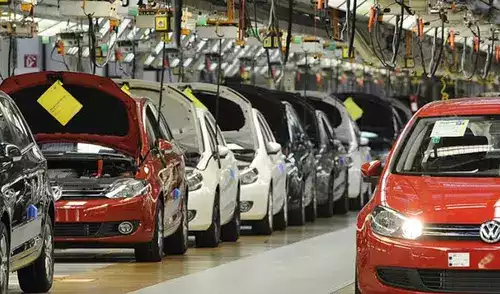 The government led by Meloni's predecessor Mario Draghi earmarked 8.7 billion euros through 2030 to support its carmaking sector.
The government led by Meloni's predecessor Mario Draghi earmarked 8.7 billion euros through 2030 to support its carmaking sector. Italian Prime Minister Giorgia Meloni plans to cut by some 4.6 billion euros ( USD 5 billion) the funds set aside to support the country's automotive industry between 2025 and 2030, the text of next year's budget showed, triggering widespread criticism.
The move comes amid a global slowdown in sales of electric vehicles (EVs), partly due to diverging policies on green incentives, which has forced automakers worldwide including Fiat-maker Stellantis to adjust their plans.
The cut "is an unacceptable surprise that blatantly contradicts the important work that the government is doing in Europe in favour of the sector to improve regulation," business lobby group ANFIA said in a statement on Monday.
"With so many ongoing issues, including transition to electrification, soft market demand in Europe and declining production in Italy, this is not supporting confidence," its Managing Director Gianmarco Giorda said.
In 2022, the government led by Meloni's predecessor Mario Draghi earmarked 8.7 billion euros through 2030 to support its carmaking sector.
But the budget unveiled this month by Economy Minister Giancarlo Giorgetti shows that the government wants to divert 4.6 billion euros out of the 5.8 billion euros planned for the 2025-2030 period to fund other measures.
Under the bill, to be approved by both houses of parliament by the end of December and therefore still subject to changes, the bulk of the cuts are concentrated between 2028 and 2030, a period in which they amount to around 2.4 billion euros.
The opposition Democratic Party (PD) seized on the disclosure to call for the resignation of Industry Minister Adolfo Urso.
"Urso, who did not even realise Giorgetti gave him no room for manoeuvre, shows that he is not up to the task," PD lawmaker Vinicio Peluffo said.
The minister said in a statement he was committed to ensuring that the automotive supply chain has the necessary tools to face the challenge of green transition.
"All resources will go into production investments with a focus on components, which is Italy's real strength," Urso added.
The reported cut could fuel further tensions between Rome and Stellantis, Italy's sole major automaker.
The government has heavily criticised the group for its falling output in Italy and for moving production abroad for some models of historic Italian brands such as Fiat, Lancia and Alfa Romeo.
For its part, Stellantis has said a target it is discussing with the government to raise its Italian output back to one million units also depends on government support, including on purchase incentives.
In an Italian parliamentary hearing earlier this month, Stellantis CEO Carlos Tavares also argued that Italy had earmarked far less funding than other major EU nations for supporting the auto industry.
Highlighting the challenges the industry faces, Europe's biggest carmaker Volkswagen announced plans to shut at least three factories in Germany, laying off tens of thousands of staff.
